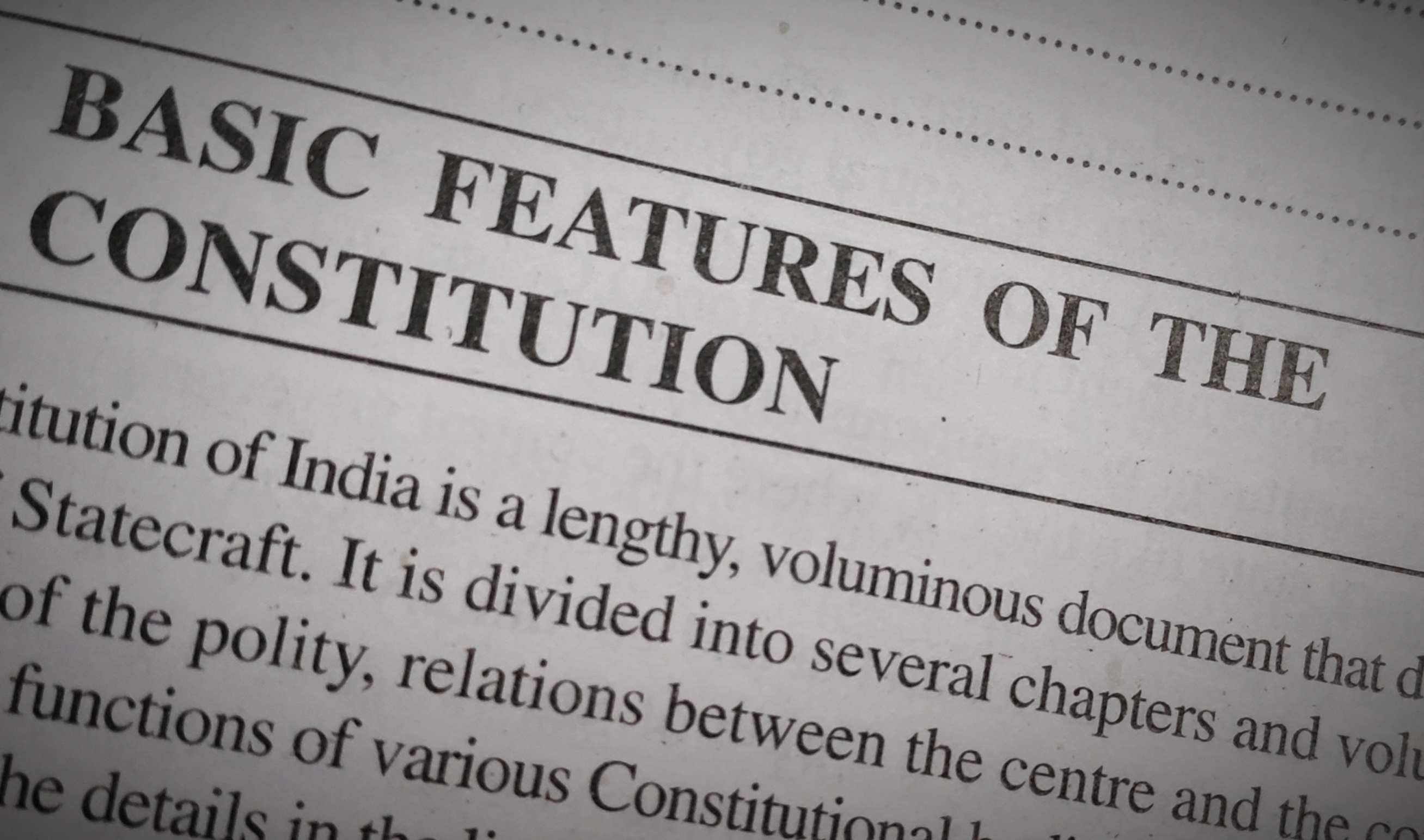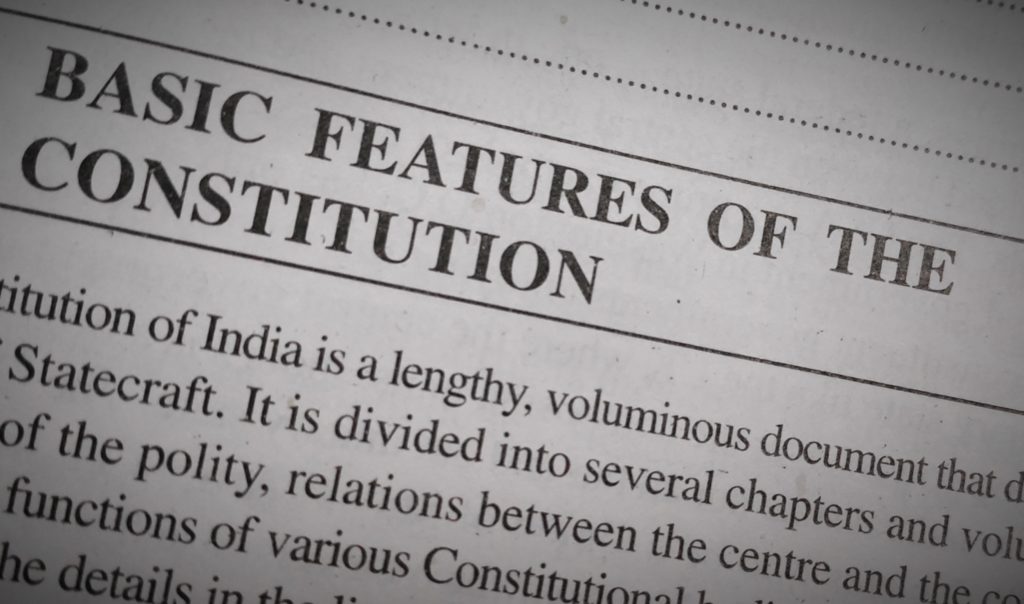Basic Features of The Indian Constitution: The constitution of India is a lengthy, voluminous document that deals with various aspects of statecraft.
Basic Features of The Indian Constitution
It is divided into several chapters and volumes that cover the nature of the polity, relations between the centre and the constituent units, power and functions of the various Constitutional bodies and so on.
It is not possible to cover all the details in the limited scope of this unit. However, we can certainly deliberate over the basic features of the Constitution. These features are:
(a) A Written Constitution;
(b) Parliamentary Democracy;
(c) Independence of the Judiciary;
(d) Cooperative Federalism;
(e) Fundamentals Rights and Duties;
(f) Directive Principles of the state policy.
Some of the features, Fundamental rights and Directive Principles of state policy, for instance, are important enough to deserve a special mention. These are perhaps a unique feature of our Constitution.
Basic Features of The Indian Constitution:
Let us now examine each of the above features in some details:
A written Constitution:
As pointed out in section 13.1, ours is a written Constitution. In fact the majority of the Constitutions in the world are written. The unwritten Constitution of the United Kingdom is a notable exception.
As the very nomenclature indicates the Constitution of our country is in the form of written document. Our Constitution though written is not rigid the way written Constitutions generally are.
This is reflected in the number of times it has been amended since independence.
Parliamentary Democracy:
As you have already read in this unit, India is a parliamentary democracy based on the Westminster model of the United Kingdom.
In such a framework the head of the government is the Prime Minister who has a Council of Ministers to coordinate with him and to assist him in the day-to-day task of the administration.
The head of the state is the President . All administration is carried on in his name. But he is a nominal executive.
The legislature, the executive and the judiciary are the three major organs of the government that interact with each other on the basis of the principle of fusion of powers.
Basic Features of The Indian Constitution:
Independence of the Judiciary:
Judicial independence is another hallmark of our Constitution. The provisions of the Constitution have ensured that the judge are able to discharge their official duties without fear or favour.
Basically there are Constitutional guarantees governing their service conditions to the effect that they do not feel any pressure in their official functioning.
Cooperative Federalism:
In the scheme of things a federal state is one in which the powers are divided between the central government and the governments of the constituent units.
The USA is a prime example of a classic federal state where the central or national government in Washington D.C. has only a few overriding powers with the constituent governments enjoying full autonomy otherwise.
In contrast is a unitary state like the UK where the central government in London enjoys superseding powers over the composing units.
India’s is a mixed case i.e., it is neither a pure federal state nor an out-and-out unitary state. The Constitution of Indian actually declares it to be a Union of States.
In the Indian scheme of things there is a list of subjects on which the central and state governments can legislate and on which the state governments alone can legislate .
However in case of any dispute the law enacted by the central government prevails, Generally the two sets of governments have acted in a spirit of cooperation, showcasing the inherent cooperative schemes laid down in the Constitution. Hence the expression ‘Cooperation Federalism’.
Basic Features of The Indian Constitution:
Fundamental Rights and Duties:
As already mentioned Fundamental Rights are a very important component of our Constitution. In fact they are probably a unique feature of our Constitution.
You may note that the keenness and insistence of the founding fathers of our Constitution to include the Fundamental Rights for all citizens were really shaped by their experience of fighting the British colonialists.
The feature of the Constitution had experience the first hand the crushing of liberties during different phases of subjugation of the British.
They determined that the citizens of free India not subjected to such experience ever again. Hence their strong emphasis on Fundamental Rights.
The Constitution guarantees certain rights to its citizens consider fundamental for their well-being. These rights are enforceable by the court of law.
They are the bedrock of an Indian citizen’s life, liberty and property. The various Fundamental Rights are:-
- Right to Equality
- Right to Freedom
- Right against Exploitation
- Right to Religion
- Cultural and Educational Rights
- Right to Constitutional Remedies
The Right to Properties was earlier a Fundamental Right but made a legal right through the 44th Constitutional Amendment Act.
Thus it is not a Fundamental Right. In effect what this means is that the property belonging to any person can be acquired by the government by paying appropriate compensation.
You should know that except during an emergency Fundamental Rights cannot be suspended. But even in such situation Articles 20 and 21 remain in operation.
These two articles deserve a mention. Article 20 states that ‘No person shall be punished on the basis of laws that are enacted after a crime has been committed(protection from ex-post facto laws), protection from being punished more than once for the same offence and protection from standing trial against oneself.
Article 21 on the other hand ensures protection of personal life and liberty.’ What this basically means is that the state does not have the right to take away the life of a person, except through the procedure established by law.
Basic Features of The Indian Constitution:
Directive Principles of State Policy:
As the very nomenclature indicates Directive Principles are guidelines to the government for just and effective governance.
The Constitution lists a series of them; for instance, provision of equal pay for equal work, prohibition of all intoxicants, especially alcohol, promotion of small and cottage industries etc.
Though the Directive Principles are not legally enforceable, this in no way means that they are unimportant.
Over the years. in post-independence India, the government of the day has enacted suitable legislation based on various Directive Principles.
Also Read this topics:
Constituent Assembly and Drafting of The Constitution
Historical Background of The Indian Constitution: The History
More Reference Click Here
****The End****

